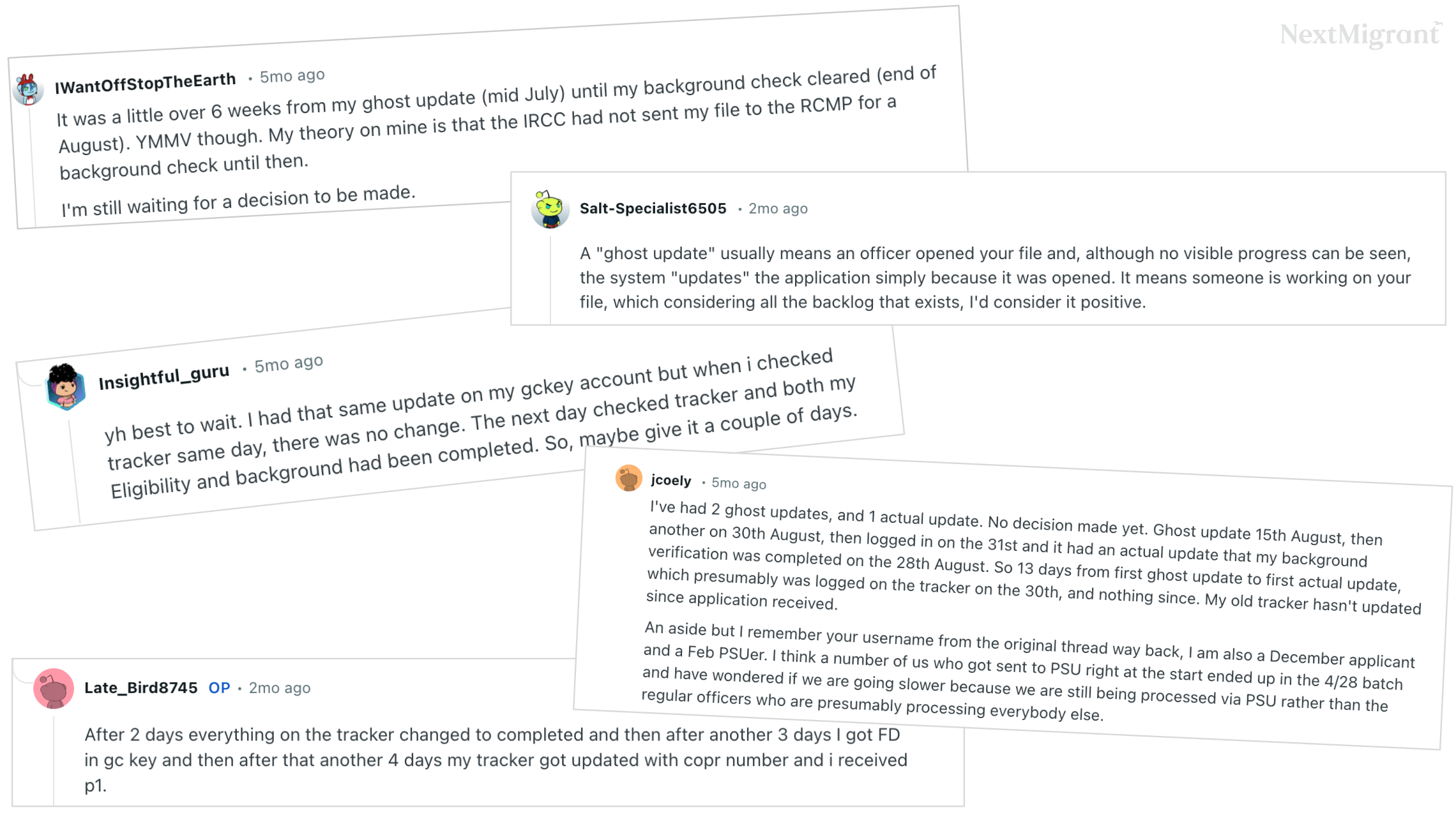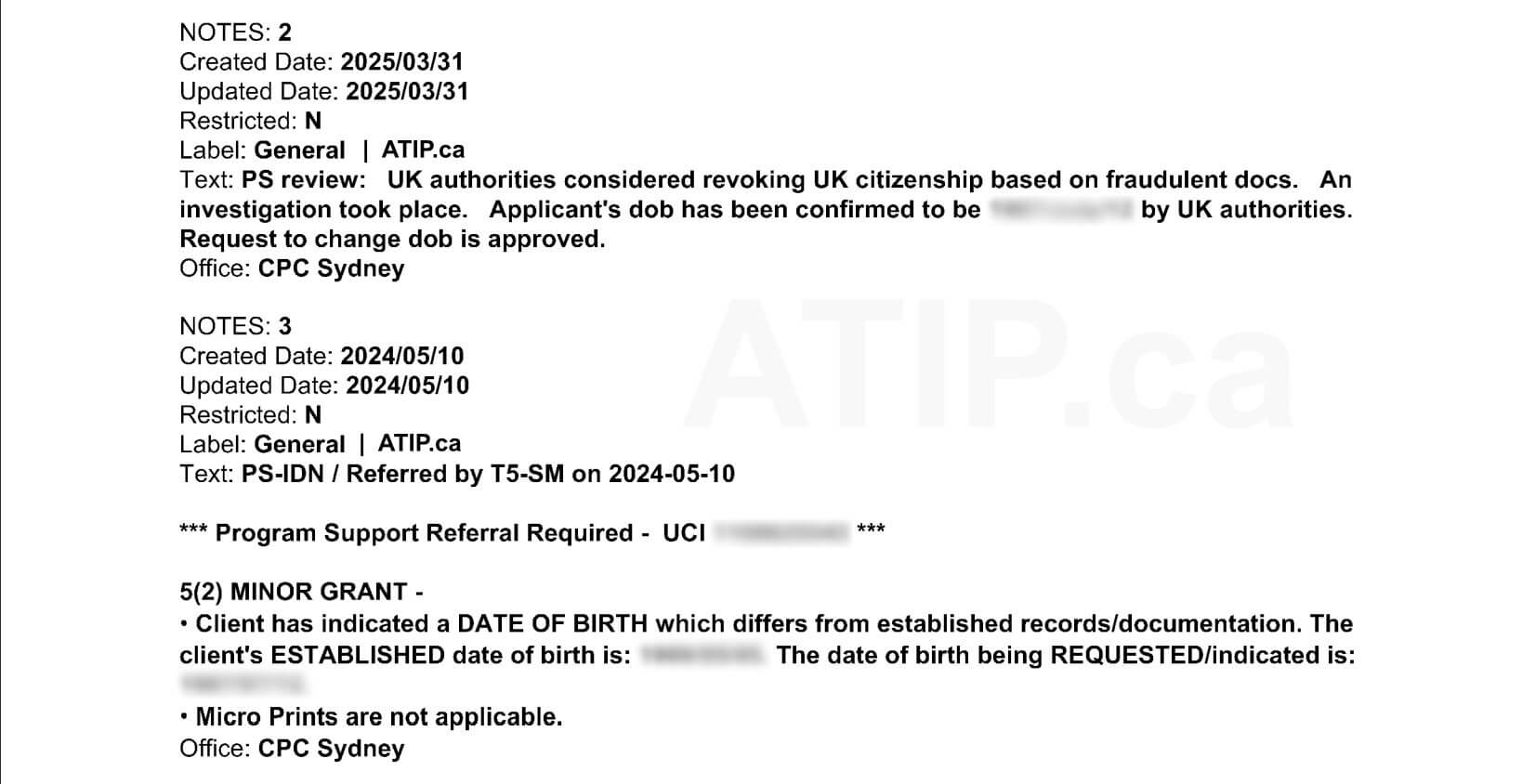If you have applied for a Canadian visa, I’m sure you are on pins to know what’s happening. Every login to your application portal can feel like a moment of truth. You refresh the page, scanning for movement, any sign that your future plans are inching closer to reality.
Then, one day, a notification appears. Your status has changed… or has it? When you click through, everything looks exactly the same. No message. No explanation. Just silence.
These mysterious updates have unsettled thousands and thousands of visa applicants, sparking anxiety, speculation, and endless forum discussions. Is it a sign of progress? A system glitch? Or is it something serious? Or worst of all, has your visa been rejected?
In this story, we'll ease into the mystery of ghost updates: what they are, why they pop up, and what they could mean for your application. We'll chat about which Canadian visas see them most often and the popular theories floating around. We'll also share simple, no-stress tips on how to handle them calmly. Because when things go quiet in the system, a bit of patience and knowing what to do next is your superpower.

What is a “Ghost Update”?
A "ghost update" refers to a change or update in the Immigration, Refugees, and Citizenship Canada (IRCC) online account, where applicants notice that the status of their application changes without any accompanying message or explanation. For instance, an applicant may receive a notification that their application status has been updated, but when they login to check, they find no visible change in the details or status messages.
In most cases, ghost updates are simply system changes and do not require any action. They do not confirm approval or refusal. Applicants should avoid checking their accounts constantly, as this only increases stress. The best approach is to wait for an official message, keep required documents ready, and follow up only if the application remains unchanged for an unusually long time.
How Ghost Updates Are Identified
Ghost updates are usually identified when an applicant logs into their IRCC account after receiving an email or a notification indicating an update on their application. The most common signs include a change in the last updated date without any visible alteration in the application status or additional requests for documentation. These updates often lead to discussions in online forums and communities, where applicants seek to understand their meaning.
Why Ghost Updates Occur
Pinpointing the exact reason for a ghost update is challenging due to IRCC’s limited public communication on the matter. However, the occurrence of ghost updates can be attributed to various factors, some of which are well understood, while others remain speculative. Guess that’s why they are called ghost updates.
Theories Behind Ghost Updates
If you have a knack for spotting hidden meanings and unexplained signals, you’re not alone. Ghost updates remain officially unexplained, but that hasn’t stopped applicants from forming their own theories. From backend system movements to silent officer actions, here are the most talked-about explanations behind these mysterious updates.
Internal Processing Milestones: One popular theory is that ghost updates correspond to internal processing milestones that the IRCC system tracks. These milestones could include stages such as the initial review, background checks, or eligibility assessments. While these updates may not be visible to applicants, they might signal that the application is progressing through different stages of the review process.
System Glitches or Technical Issues: Another plausible explanation is that ghost updates result from system glitches or technical issues within the IRCC's online portal. These glitches might cause the system to generate update notifications without any substantial changes to the application. Such technical hiccups can create confusion and anxiety among applicants who might misinterpret these updates as significant.
Application Review Queue Position: Some applicants believe that ghost updates might be linked to changes in their position within the application review queue. As applications are shuffled and prioritized based on various criteria, ghost updates could indicate that an application has moved forward in the queue, though no immediate action is taken.
Official vs. Speculative Explanations: While the above theories provide some insight, it's important to note that the IRCC has not officially confirmed any of these explanations. As a result, much of the understanding around ghost updates remains speculative, with applicants piecing together information from shared experiences and expert opinions
Types of Canadian Visas Affected by Ghost Updates
If you think ghost updates only haunt a specific group of applicants, think again. From long-term immigration pathways to temporary visas, these silent updates surface across several categories. Let’s explore who’s most affected.
Citizenship applications - Citizenship Applications: Citizenship applicants also report experiencing ghost updates, though less frequently than temporary or permanent residence streams. Given the long processing times and limited status detail available in online trackers, these unexplained updates can raise hopes of progress or trigger concern, especially for applicants awaiting tests, interviews, or oath ceremonies.
Permanent Residence Applications: Ghost updates are commonly reported by those applying for permanent residence, especially through programs like Express Entry. Since the stakes are high and the process can be lengthy, these updates can lead to heightened anxiety among applicants.
Study Permits: Study permit applicants are among the most frequent reporters of ghost updates. Given the large volume of applications and the tight timelines associated with academic programs, these updates often cause significant concern among students waiting for their permits.
Work Permits: Work permit applicants also report experiencing ghost updates. These updates can be particularly stressful for individuals who are waiting to start employment or are concerned about their current job status.
Other Visa Categories: Other visa categories, such as visitor visas or family sponsorships, are not immune to ghost updates. Although less common, applicants in these categories also occasionally report seeing these unexplained changes in their application status.
Significance of Ghost Updates for Applicants
Ghost updates might indicate that the application is undergoing internal checks or that some aspect of the application has been reviewed, even if there is no immediate action required from the applicant. While it’s tempting to jump to conclusions, it’s crucial to remember that these updates do not necessarily predict the outcome of the application.
Misconceptions and Myths Surrounding Ghost Updates
Several misconceptions surround ghost updates. Some believe that a ghost update is a sure sign of a negative decision, while others think it could indicate a problem with their application. These myths often circulate in online communities, exacerbating the anxiety of applicants.
Please note that these are all theories;
Ghost Update Equals Rejection: Many believe that a ghost update is a clear sign that their application will be rejected.
Indication of Technical Issues: Some applicants think that a ghost update signals a problem with their application or the submission process.
Automatic Application Withdrawal: There is a misconception that if a ghost update occurs, it means the application was automatically withdrawn or disqualified.
Immediate Response Expected: Some applicants assume that after a ghost update, a decision will follow immediately, causing unnecessary anxiety if there’s a delay.
Ghost Updates Affect Decision Outcome: Another myth is that ghost updates somehow influence or alter the outcome of an application, either positively or negatively.
Everyone Experiences Ghost Updates: Some believe that all applicants should expect to see ghost updates, leading to confusion when they don’t experience one.
Ghost Updates Mean Your Application is Stuck: There’s a belief that if a ghost update occurs, the application is in limbo and will be delayed indefinitely.
Ghost Updates Are a Deliberate Tactic: Some think that organisations use ghost updates as a psychological tactic to test applicants' patience or resolve.
While ghost updates may feel alarming, they are rarely a cause for concern. These theories are largely speculative and not backed by official guidance. In most cases, ghost updates have no bearing on the final outcome, so it’s best not to read too much into them. Moreover, ghost updates can be decoded using specific tools and processes that provide real insight into your application’s progress.
What to Do When You Encounter a Ghost Update
If you encounter a ghost update, understand that these updates are not uncommon and do not necessarily signal a problem with your application. Avoid making any hasty decisions or conclusions based on the update alone.
Monitoring Your IRCC Account
Continue to monitor your IRCC account regularly but resist the urge to check obsessively. Sometimes GC key and IRCC portals take time to reflect changes and your ghost update might be an actual update on your application, however, refrain from constant checking as it will only add to your stress.
In many cases, applicants notice dashboard changes within 1–2 days of receiving an email alert.
When and How to Contact IRCC
If a ghost update leaves you particularly concerned, or if you experience a prolonged period of silence after such an update, you may consider contacting IRCC for clarification. Be prepared for the possibility that the representative may not have additional information to offer.
Ordering GCMS Notes
If you experience a ghost update and your application is taking longer than expected, your best bet is to order GCMS (Global Case Management System) or ATIP notes to see what has actually changed in your application. These notes provide detailed insights into your file, including any updates that might not yet be visible in your IRCC account.
How to Decode Ghost Updates with ATIP Notes
If a ghost update has left you searching for answers, ordering ATIP (GCMS) notes can provide real clarity. ATIP.ca, can help applicants request official records from IRCC that reveal internal notes, officer comments, and processing stages not shown in the online portal. These details often explain what triggered a ghost update, helping replace speculation with verified information and peace of mind.
Ghost Update Example

This image is a perfect example of a 'Ghost update.' It happened when the applicant receveid a notification about their citizenship application, but nothing looks different in their portal. The update only showed up in the ATIP notes.
Ghost updates may feel unsettling, especially when you’re already emotionally invested in the outcome of your Canadian visa application. The silence, the lack of explanation, and the endless theories online can easily make your mind jump to worst-case scenarios. But as we’ve seen, ghost updates are a common part of the process and, more often than not, simply reflect routine system activity rather than bad news.
The key is to stay calm, informed, and patient. A ghost update does not define your application, predict a rejection, or mean something has gone wrong. By understanding what they are, and knowing that there are reliable ways, like GCMS notes, to gain clarity if needed, you can avoid unnecessary stress and focus on what truly matters.
FAQs
1. What exactly is a ghost update in a Canadian visa application?
A ghost update occurs when your IRCC account shows that your application has been updated, but there is no visible change, message, or request when you log in. It’s essentially an update without an explanation.
2. Is a ghost update a sign that my visa has been rejected?
No. A ghost update does not indicate rejection or approval. There is no evidence to suggest that these updates are linked to negative decisions.
3. Do ghost updates mean something is wrong with my application?
Not necessarily. In most cases, ghost updates are part of internal processing or system activity and do not mean there is an issue with your application.
4. Which Canadian visa applications experience ghost updates most often?
Ghost updates are most commonly reported in permanent residence applications (such as Express Entry), study permits, and work permits, though they can occur in other visa categories as well.
5. How long after a ghost update should I expect a decision?
There is no fixed timeline. Some applicants receive further updates soon after, while others may wait weeks or months. A ghost update does not guarantee an immediate decision.
6. Should I contact IRCC after receiving a ghost update?
You generally don’t need to contact IRCC right away. However, if your application has exceeded normal processing times or the update causes significant concern, you may reach out for clarification.
7. Can ordering GCMS notes help me understand a ghost update?
Yes. GCMS or ATIP notes can provide insight into internal actions taken on your application that are not visible in your IRCC account, making them useful if delays persist.
8. What is the best way to deal with the stress caused by ghost updates?
The best approach is to stay informed, avoid overchecking your account, and remember that ghost updates are common and usually harmless. Patience and perspective can greatly reduce anxiety during the waiting period.
9. Can ATIP notes explain ghost updates?
Yes. ATIP (GCMS) notes can show internal reviews or actions not visible in your IRCC account, often clarifying what triggered a ghost update.
10. How long should I wait after a ghost update?
There is no set timeframe for what happens after a ghost update. The next step could occur within days, weeks, or even months. During this period, patience is essential.
11. Do ghost updates affect my application outcome?
No. Ghost updates do not directly impact the outcome of your application. They are a normal part of the processing workflow and do not signal a decision.
12. Can ghost updates be a sign of approval or rejection?
There is no evidence that ghost updates indicate either approval or rejection. Any final decision will be clearly communicated through your IRCC account or via official correspondence.
